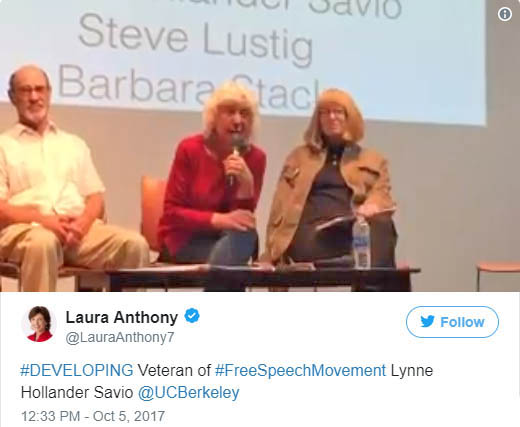10/5/2017 UCB Free Speech in the Age of Social Media Barbara Stack
I was a high school senior in New Hampshire in the fall of 1964.
In 1984, Nancy Skinner and Eleanor Walden hired me to work on the 20th Anniversary Commemoration of the FSM, hosted by The Graduate Assembly. I recognized in the issues, and the history, and the people I met, something to cherish. I’m now on the FSM Archives Board and am its archivist and webmaster.
The idea of free speech is deceptively simple. In fact, it takes time and effort to understand it well. In 1964, it took the Berkeley campus almost the full fall semester to get it right. And it was, and is, worthy of the effort. Alas, free speech doesn’t stay learned by a campus, and must be revisited. I applaud Chancellor Christ for getting it right from the beginning, and for realizing what it would take to share the lessons with the entire campus.
I should point out that the 1964 UC FSM was not the first student Free Speech Movement. The Struggle for Free Speech at City College of New York, 1931 to 1942 is notable, as is the 1934 UCLA Free Speech Movement. For details, see our website, FSM-A.org and Robert Cohen’s book, “When the Old left was Young.” On this campus there were serious Free Speech issues in the 1930s. See the Peter Franck Interview on the OAC website.
The 1964 FSM is often celebrated for its marches and rallies and occupations and general posture of resistance. Participants, however, tend to recall its endless meetings, indoors and out, where valiant speakers did their best to persuade and most tried to understand one another. This should not be overlooked.
The First Amendment was to the FSM really more of a tool or portal for the original work of many of the FSMers, civil rights. It has been alleged that there was a secret, sub rosa mission of the FSM. A few claim that it was the spread of Communism. Many, many more however, agree that it was, in fact, the 14th Amendment, ratified in 1868. This is the amendment that outlaws states from denying citizens “life, liberty, or property, without due process of law; nor deny to any person within its jurisdiction the equal protection of the laws.’
Among the slogans of the FSM was “First and Fourteenth or fight!”
The 14th Amendment is also worthy of your attention.
The FSM was terrific at social media. They excelled at public address technology, oratory, printing, photography, song-writing, singing, and the recording and release of professional 45 rpm and 33 rpm records; they issued highly-crafted handbills and press releases almost daily; they made no posters, but they had a polished newsletter and at least one active cartoonist; they created slogans, pins, armbands, punch card mementos; a set of FSM punch cards is currently on display in London’s Design Museum, part of a show on California Design. And the FSM students wrote letters home, lots and lots of letters. The issue dominated dinner table conversation around the state for at least 3 months.
Many FSM participants understood, even as it was just beginning to unfold, the historical significance of what they were undertaking. They preserved all the reproduction masters for their handbills and press releases. They saved a set of uncirculated documents. Many individuals kept personal collections, and preserved them for decades. The FSMers understood that they existed in time, and had a substantial grasp of both the past and the future. In the midst of all the activity in the fall of 1964, Lynne Hollander and Michael Rossman organized a crew to write and publish a review of campus past and present political issues, much the work of the campus organization SLATE, under the title “Administrative Pressures & Student Political Activity.” It remains a significant and useful document and there is a full transcription on the Bancroft website. And almost all of these collections mentioned have made it to 2017.
So the FSMers were quite deliberately trying to hack the future, even as they mined and challenged the past, and hacked 1964. It was with this goal that the Free Speech Movement Archives was birthed in 1996. Michael Rossman wrote, “our motives are as holy as cherry pie -- to testify for free speech by passing our history on to our children and beyond, along with the live charge and complexity of understanding it, as best we can.”
I think that the critical issue now is not whether hate speech should be countered, but where in the legal system restrictions on free speech should be encoded, and how—what is rule; what is practice. Time, place and manner make an appearance in both federal jurisprudence and in campus regulations. It’s time to get to the details of these matters.
And finally, I believe that there is great potential for Free Speech to be a unifying issue across a wide political spectrum. There is much we can agree on.
A few months ago the FSM Archives made a statement on free speech. Breitbart carried a quotation from it and listed our names. A few weeks after that I was at a memorial service and caught the eye of someone I knew to be conservative who was across the room and he came over to talk to me. And he said, “Is it true? Are you really for free speech? And I said, “Yes, indeed. Our position is more or less, ‘Let the bigots speak; and let the bigots be heard.’” He said, “It’s incredible, you’re for free speech.” And I said, “Yeah, what else could we be for? And, now there’s a whole lot of nonsense going around these days.” And he agreed with that too.
Thank you. |


